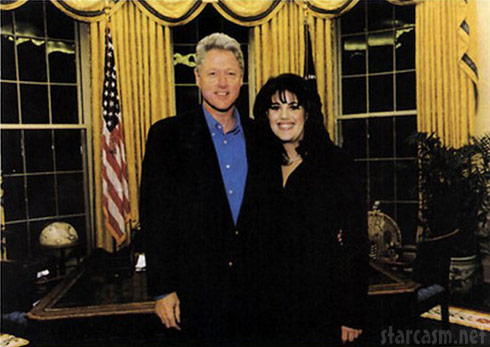PHOTO Monica Lewinsky opens up on Bill Clinton affair for first time in a decade
Sixteen years after her consensual relationship with then-President Bill Clinton nearly lost him the office, Monica Lewinsky is ready to stop “tiptoeing around my past — and other people’s futures.”
“I am determined to have a different ending to my story. I’ve decided, finally, to stick my head above the parapet so that I can take back my narrative and give a purpose to my past,” Monica, now 40, wrote for Vanity Fair. “What this will cost me, I will soon find out.”
As American history books now document, Monica had an affair with President Clinton between 1995 and 1997, when she was a young White House intern. She later shared the details of her relationship with Pentagon co-worker Linda Tripp, who secretly recorded their conversations. After news of Monica and President Clinton’s relationship was leaked in January 1998, Clinton famously denied having “sexual relations.” He was later impeached for lying under oath.
Although much of the media coverage evolved around Clinton and the future of his presidency, Monica became famous for — as she phrased it around the time — “something that’s not so great to be known for.” She did a select few interviews after the scandal and appeared on Saturday Night Live in the late 1990s and early 2000s. But, by the mid-2000s, she largely retreated from the spotlight and intentionally avoided publicity.
Now ready to speak out again, Monica said she was taken advantage of by her boss — but that paled in comparison to the treatment she received after the affair.
“Any ‘abuse’ came in the aftermath, when I was made a scapegoat in order to protect his powerful position,” Monica wrote. “The Clinton administration, the special prosecutor’s minions, the political operatives on both sides of the aisle, and the media were able to brand me. And that brand stuck, in part because it was imbued with power.”
At the time, Monica said she turned down book deals that would have netted her close to $10 million because that “didn’t feel like the right thing to do.” What she didn’t realize then, she says, is that her job prospects would be very limited in the future, despite her master’s degree in social psychology at the London School of Economics.

Monica Lewinsky at the London School of Economics in 2005.
“Because of what potential employers so tactfully referred to as my ‘history,’ I was never ‘quite right’ for the position. In some cases, I was right for all the wrong reasons, as in ‘Of course, your job would require you to attend our events.’ And, of course, these would be events at which press would be in attendance.”
Still, Monica said money isn’t what’s motivating her to speak now. Rather, she was driven to go public after 18-year-old Rutgers student Tyler Clementi committed suicide in 2010 because of harsh bullying.
“My own suffering took on a different meaning,” Monica said of the aftermath of Tyler’s suicide. “Perhaps by sharing my story, I reasoned, I might be able to help others in their darkest moments of humiliation. The question became: How do I find and give a purpose to my past?”
She now aims to “get involved with efforts on behalf of victims of online humiliation and harassment and to start speaking on this topic in public forums.”





